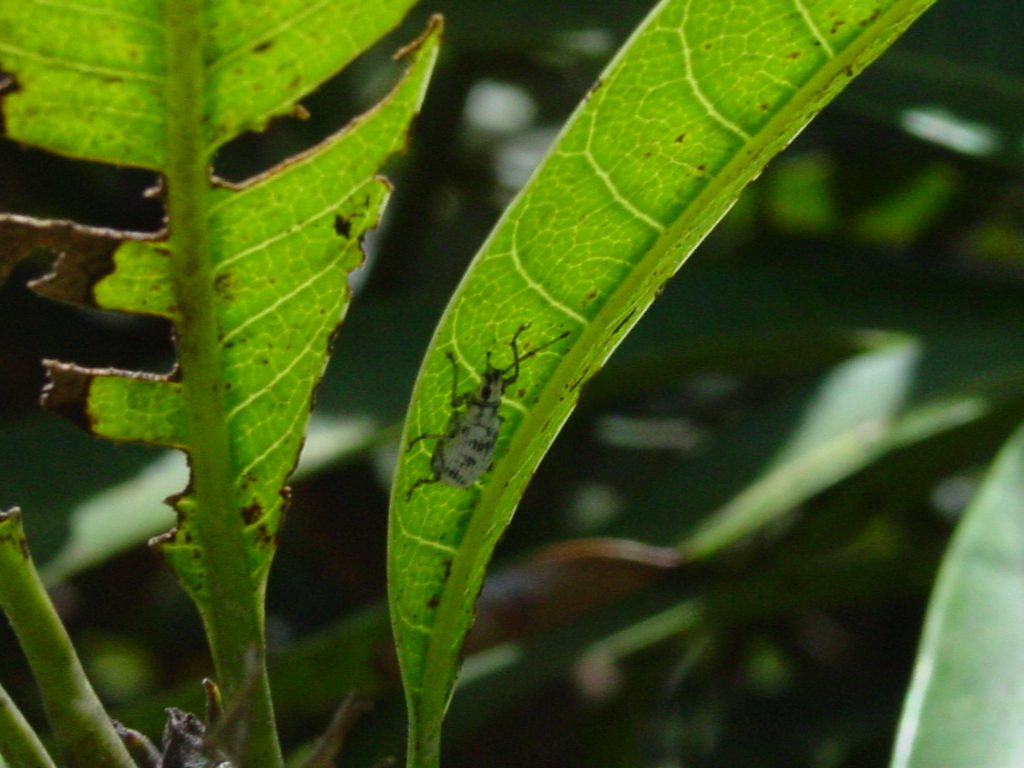When it comes to dealing with insect pests of tropical fruit, try not to think “What do I spray?” Instead, use a balanced approach to pest control that will use pesticides only when completely necessary.
The most common pests for tropical fruit are scale, weevils, fruit flies, and whitefly with thrips, spider mites and aphids also factoring in to a lesser degree. Most pests do only superficial damage and are controlled quite well by horticultural strategies and natural predators.
Good Horticulture
Fruit trees are able to deal with pest problems much better if they are healthy and adequately spaced to allow for air flow and maximum sunlight. A weak or crowded tree will be easier prey for insects, so proper nutrition, sunlight, spacing and watering are major factors in the health of a tree.
Let Nature Take Its Course
Natural predators are also a key factor in controlling pest populations. In most cases, each pest is matched with a hungry predator that will do an excellent job of cleaning up the pests before they become a problem. Spraying a pesticide before you wait for help from predators will invariably kill off the predator population that was beginning to build, and because predators usually breed in much smaller numbers than pests, the pest population will rebound quicker from the pesticide.
Planting a variety of different types of plants in your yard or grove and keeping insecticidal spray to a minimum will help to boost your predator numbers. Buying natural predators is tricky because the predator you purchase must be matched exactly with the pest you are trying to control.
Home versus Commercial
Homeowners can tolerate a much greater amount of pest damage than commercial growers as black spots or a light crop are okay for the backyard grower, but may mean financial ruin for the commercial grower. The consumer will typically not tolerate ugly fruit; therefore, commercial growers often have a set spray schedule to deal with the pests they have identified as potential problems. Commercial growers are very careful with their pesticide use and know that using pesticides that are not labeled for their crop or using incorrect application rates can result in fines or even jail time.
The Label is the Law
If you determine that insects are doing a large amount of damage to your fruit trees and you do decide to use a pesticide, make sure you are extremely careful with what you spray. In every case, use the least toxic product available. All pesticides are labeled Caution, Warning and Danger with the Caution label being the least toxic and Danger being the most toxic.
Be careful not to spray if it is windy as the spray will often drift to unwanted locations. Try to spray when the sun is low in the sky as some pesticides can burn plants if applied when the sun is at full strength.

Every pesticide will have a label that will give information as to what the product is safe to be applied on. Make sure if you are spraying on tropical fruit, the type of fruit you are spraying is listed on the label. If the fruit is not on the label, you should not spray the product and doing so may result in unsafe levels of pesticide entering into the fruit.
Labels will also have what personal protective equipment you need to wear, proper mixing rates, and any environmental concerns such as being toxic to bees or unsafe to be sprayed near waterways.
Remember, the label is the law and doing anything contrary to what the label states is a violation of the law and is considered unsafe.
Balance is the Key
Use a balanced approach when dealing with insect pests on your fruit trees. Good horticulture and encouraging predators are great strategies that will discourage pest populations from getting a foothold on your trees. Pesticides can be a part of your overall strategy, but should be used as a last resort rather than the first tool to come out of the box.
 1
1
